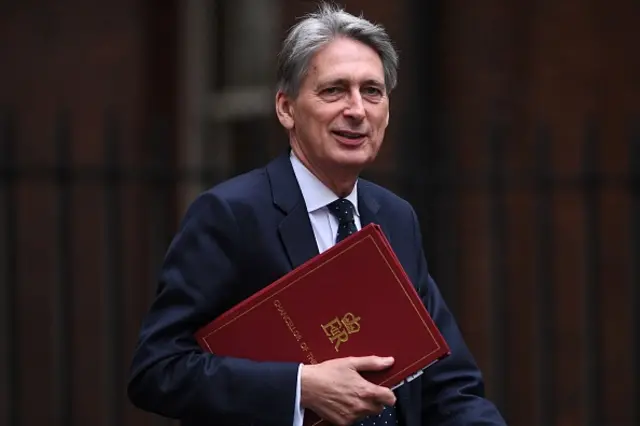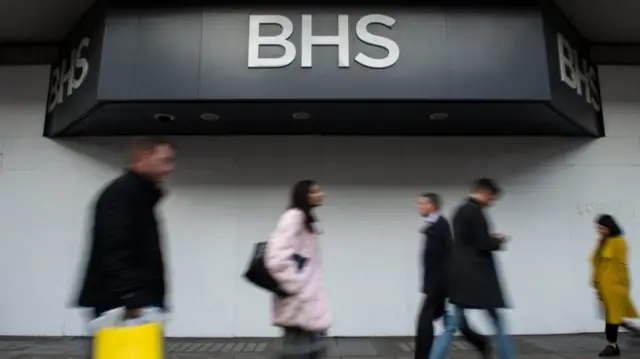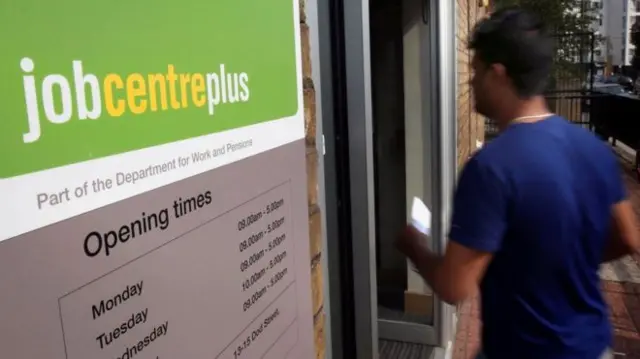IDS: Raising tax threshold a 'down payment'published at 08:23 GMT 23 November 2016
The former work and pensions secretary addresses the merits of the chancellor's plans.
Government borrowing to be £122bn higher: OBR
Growth forecasts cut for 2017 and 2018
Employee perks targeted; fuel duty frozen; letting-fees ban
£23bn infrastructure fund announced
McDonnell: Chancellor's spending plans 'offer no hope'
Dearbail Jordan
The former work and pensions secretary addresses the merits of the chancellor's plans.
 Today Programme
Today Programme
BBC Radio 4
David Wernick is head of the Wernick Group, which sells portable cabins up and down the country.
He tells Radio 4 the chancellor has been too gloomy about the UK economy since the Brexit vote.
"He should be talking up the British economy and looking to the positive effects of Brexit and the opportunities it offers us.
"If the chancellor himself is talking down the economy it's going to affect business, it's going to effect thinking, and business activity could drop and we could have a self-fulfilling prophecy."
 Today Programme
Today Programme
BBC Radio 4
 Image source, Getty Images
Image source, Getty ImagesAny infrastructure announcements in the Autumn Statement need to “underpin the operation of the economy” says Bridget Rosewell, who sits on the National Infrastructure Commission, a non-ministerial body which advises the government on the country’s infrastructure needs.
That could cover better communications, transport or energy networks, she says.
She hopes the Chancellor will unveil some new infrastructure projects today and says that they don’t have to be big.
She adds that funding needn’t all come from the taxpayer – the Chancellor could well use private investment to bankroll his plans too.
Homelessness charity tweets...
Allow X content?
This article contains content provided by X. We ask for your permission before anything is loaded, as they may be using cookies and other technologies. You may want to read X’s cookie policy, external and privacy policy, external before accepting. To view this content choose ‘accept and continue’.
 BBC Radio 5 live
BBC Radio 5 live
 Image source, PA
Image source, PAThe Chancellor is going to announce £1.4bn towards building 40,000 affordable houses.
Chris Carr, chair of the Federation of Master Builders, says how much of an impact it will have will depend how and where the money is spent.
"We need more intermediate housing. We need more shared equity and shared ownership. We need to get people back on the housing ladder rather than going on just pure rented. I mean, pure rented is ideal for London and the south-east, but there's certain areas of the country, especially round the north-west, north-east, probably Midlands and Yorkshire and Humber that need more intermediate housing, its gets people on there. So as long as the funds go equally in each direction, then I'll be happy."
Former Chancellor tweets...
Allow X content?
This article contains content provided by X. We ask for your permission before anything is loaded, as they may be using cookies and other technologies. You may want to read X’s cookie policy, external and privacy policy, external before accepting. To view this content choose ‘accept and continue’.
 Today Programme
Today Programme
BBC Radio 4
Theresa May has been under pressure to improve prosperity outside London, including in the north of England.
David Dunn, chief executive of Sunderland Software City, a tech hub, says Sunderland companies want the same as companies across the UK - the opportunity to "do more business and be more competitive".
He welcomes some of the pre-Autumn Statement announcements such as the promise to improve regional broadband. 5G, for example, could benefit not just tech firms but "disrupt" the way every industry does business.
That said, he wants to hear more about how the government will help regional business become more competitive. Initiatives unveiled this week such as the Small Business Research Initiative and Industrial Strategy Challenge Fund sounds interesting but are short on detail, he says.
In a pre-Autumn Statement announcement the chancellor has promised to boost the National Minimum Wage. But the FT's chief political correspondent tweets:
Allow X content?
This article contains content provided by X. We ask for your permission before anything is loaded, as they may be using cookies and other technologies. You may want to read X’s cookie policy, external and privacy policy, external before accepting. To view this content choose ‘accept and continue’.
 Image source, Getty Images
Image source, Getty ImagesThomas Cook profits have fallen after terror attacks in Turkey and Brussels.
The holiday operator said yearly underlying profit from operations fell £41m to £308m, external.
"This reflects the decline in customer demand for Turkey, which impacted Condor in particular, and the effect on our Belgian business of the Brussels attacks," said Thomas Cook chief executive Peter Fankhauser.
Turkey was Thomas Cook's second biggest market in 2015, according to Hargreaves Lansdown.
In June, 41 people were killed and 230 hurt in a gun and bomb attack at Istanbul's Ataturk international airport.
In March bombings at Brussels airport and a metro station in the city killed 32 people.
 BBC Radio 5 live
BBC Radio 5 live
 Image source, Getty Images
Image source, Getty ImagesWhat will the Chancellor's priorities be in his Autumn Statement?
Kallum Pickering, senior economist at Berenberg Bank, tells Wake Up to Money:
Quote MessageThe essential challenge for the Chancellor is twofold. First, he needs to deal with a modest demand-side shock from the uncertainty from Brexit over the next couple of years, and then in the longer run, he needs to deal with what is essentially a supplyside shock from Brexit. The OBR will look at Britain’s exit from the EU and say that will lower the pace of trend growth, so he has to manage his budget around that. Does he ease in the near term to help the economy through this period of uncertainty, but then how does he rebalance spending and taxation so that at some point in the future, probably 2022/2023, he balances his budget?"
Kallum Pickering, Senior economist at Berenberg Bank
 Today Programme
Today Programme
BBC Radio 4
The Office of Budgetary Responsibility is likely to downgrade UK growth forecasts later today - and government borrowing is set to go up.
The risk is that credit ratings agencies get twitchy and downgrade the UK, pushing up the cost of borrowing, says Mike Amey of Pimco.
Agencies will look at the UK's "total level of debt, and whether it is on a stable path," he says.
"If it starts to go up substantially, the level as a percentage of total output, that would be a big warning sign to the ratings agencies," he adds.
 Today Programme
Today Programme
BBC Radio 4
 Image source, Getty Images
Image source, Getty ImagesThe Dow Jones share market in the US closed above 19,000 for the first time ever yesterday.
Mike Amey, a managing director at Pimco, tells Today there are a number of reasons for this.
First, President-elect Trump has promised to splurge on infrastructure while cutting taxes, potentially boosting US growth.
Second, investors were defensive before the US election but have regained confidence - particularly as Trump's tone now appears to be less inflammatory than many feared.
Finally, the world economy seems to be moving towards a "healthier balance" between fiscal and monetary policy, which is again likely to lift growth.
 Simon Atkinson
Simon Atkinson
Asia Business Reporter
 Image source, Reuters
Image source, ReutersThey've been held in China for more than a month, but now three Australian employees of the James Packer-controlled casino operator Crown Resorts have been formally arrested.
The trio are suspected of promoting gambling to Chinese nationals - something that's illegal in China. Among those held is the executive in charge of attracting Chinese high-rollers to Australia.
Another 15 people - all thought to be Chinese nationals - were detained at the same time as the Australians. And while we know one has been bailed, the fate of the other 14 is less clear.
Like many Asian casino firms, wealthy Chinese gamblers make up an important part of Crown's clientele. But most analysts expect this will mean the end of Crown's efforts within China to recruit rich players to its roulette wheels and baccarat tables in Melbourne and Perth.
 Today Programme
Today Programme
BBC Radio 4
Philip Hammond doesn't have much scope for giveaways in today's Autumn Statement, Lucy O'Carroll of Aberdeen Asset Management tells Today.
That's because the public finances are expected to worsen by some £100bn over five years, making previous deficit reduction targets unachievable.
Jonathan Portes, a research fellow at the National Institute of Economic, agrees.
He says there is a natural tension between the Prime Minister - who will want to spend for political reasons - and the Chancellor who must protect the public finances.
He says the Treasury's caution is well justified as there is so much uncertainty around the UK's Brexit negotiations.
 Leisha Chi
Leisha Chi
Business reporter in Singapore
 Image source, Getty Images
Image source, Getty ImagesThe market bulls are showing no sign of slowing down.
Asian bourses are trading higher after Wall Street's main indices ended at record highs for the second day in a row.
The Dow surpassed 19,000 points for the first time while the S&P rose 0.2% and the tech-heavy Nasdaq gained 0.3%.
Sydney's benchmark S&P/ASX 200 rose 1.3% to 5,484.40 while New Zealand stocks gained 0.5%.
In Seoul the Kospi added 0.3% to end at 1,989.80. Shanghai, Hong Kong, Taiwan and Singapore stocks also rose.
Japan's markets are closed for a public holiday.
 Image source, Getty Images
Image source, Getty ImagesThe chairman of a committee probing the collapse of BHS has asked the Pensions Regulator whether assets can be seized from former owner Sir Philip Green.
In a letter to Lesley Titcomb, MP Frank Field asks whether the pensions hole could be plugged by "acquiring assets other than cash" from Sir Philip.
Ms Titcomb is due to appear before Mr Field's Work and Pensions Committee early on Wednesday.
Sir Philip's assets include yachts. He could not be reached for comment.
 Image source, PA
Image source, PAAhead of his Autumn Statement, the Chancellor has pledged to ease the burden on those who receive Universal Credit - the benefit introduced in 2013 to replace six means-tested benefits and tax credits including Jobseekers Allowance and housing benefit.
It will do this by reducing the rate at which the benefit can be withdrawn from people once they find work from 65% to 63% (the so called "taper rate"). In short, it will take 63p of every pound of net earnings as opposed to 65p.
But the Resolution Foundation think tank said the gains will be "small fry" compared with previously-announced cuts to the work allowance.
Shadow chancellor John McDonnell, meanwhile, called the reduction "too little, too late for those working families who have had to bear the brunt of six wasted years of failed Tory economic policies".
"Despite all their rhetoric last month, and before the ink is even dry on the Autumn Statement, it looks like it will be jam tomorrow for working people under Theresa May and Philip Hammond."
 BBC Radio 5 live
BBC Radio 5 live
Letting agent fees fall into three categories - referencing costs, contract negotiation, and the inventory when the tenant moves in, says David Cox, managing director at the Association of Residential Letting Agents.
Although the Citizen's Advice Bureau says the average fees are £337, Mr Cox says ARLA members charge £202 on average.
"When you consider on average it takes 14 to 17 hours to undertake all the necessary checks, on top of the cost of the [credit] referencing fees which can be around £25, the cost of the offices, the staff, we think that's actually a legitimate fee, a reasonable sum, for the services that are being provided to tenants. And in the end these fees do need to be covered some way, so... these fees are now going to get passed on to the landlords, who will just pass them back onto tenants in rent, and therefore if tenants renew the properties, renew their tenancies, they're probably going to end up paying these fees again."
What's going to be in the Autumn Statement? Take a look at our animated guide.
 BBC Radio 5 live
BBC Radio 5 live
 Image source, PA
Image source, PAIn keeping with tradition, there's already been a number of Autumn Statement measures announced.
There's been a pledge to spend more than £1bn on road improvements, and £2bn per year on research and development.
The minimum wage will rise from £7.20 to £7.50 in April, and there will be a push on housing with £1.4bn to build 40,000 homes.
There will also be a ban on the fees charged by letting agents. David Cox, managing director at the Association of Residential Letting Agents tells Wake Up to Money that the measure has "come somewhat as a bolt out of the blue".
"We certainly believe that letting agent fees need to be open, the need to be upfront, they need to be transparent and they should be reasonable. They do represent legitimate costs to business."